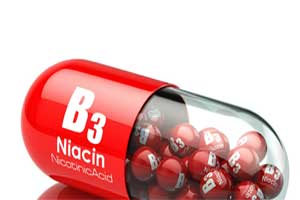- Home
- Editorial
- News
- Practice Guidelines
- Anesthesiology Guidelines
- Cancer Guidelines
- Cardiac Sciences Guidelines
- Critical Care Guidelines
- Dentistry Guidelines
- Dermatology Guidelines
- Diabetes and Endo Guidelines
- Diagnostics Guidelines
- ENT Guidelines
- Featured Practice Guidelines
- Gastroenterology Guidelines
- Geriatrics Guidelines
- Medicine Guidelines
- Nephrology Guidelines
- Neurosciences Guidelines
- Obs and Gynae Guidelines
- Ophthalmology Guidelines
- Orthopaedics Guidelines
- Paediatrics Guidelines
- Psychiatry Guidelines
- Pulmonology Guidelines
- Radiology Guidelines
- Surgery Guidelines
- Urology Guidelines
Niacin increases risk of diabetes without reducing MI,Stroke risk

Prescription Niacin often used for Dyslipidemia, does not reduce the occurrence of myocardial infarction MI, stroke, or overall mortality when used for primary or secondary prevention of cardiovascular events, according to a new review study published in the journal American Family Physician. In addition to this, there was an apparent increased risk of developing diabetes mellitus in patients who used niacin
The review was conducted by Joseph R. Yancey, MD, Defense Health Agency, Falls Church, Virginia and Jeanmarie B. Rey, MD, Fort Belvoir Community Hospital, Fort Belvoir, Virginia, to assess the effectiveness of niacin therapy (monotherapy or in addition to statin therapy) vs. placebo in terms of overall mortality, cardiovascular events, cerebrovascular events, and adverse effects.
Niacin is an effective agent for increasing serum levels of high-density lipoprotein (HDL) cholesterol. Previous research has shown that lower levels of HDL cholesterol are independently linked with an increased risk of cardiovascular disease (CVD), and use of prescription niacin could raise HDL cholesterol levels and may reduce cardiovascular events.
This Cochrane review included 23 randomized controlled trials (published between 1968 and 2015) involving 39,195 participants. The authors looked for studies including patients who were considered at risk of CVD as well as those with known CVD. The primary outcome examined was overall mortality, as discussed in 12 high-quality studies. Niacin did not appear to lower overall mortality. Concurrent statin use, comorbidities, and duration of niacin treatment did not change the impact on the primary outcome. Niacin also had no apparent impact on the secondary outcomes of myocardial infarctions, strokes, or need for revascularization procedures.
Following were the inferences made from the study
- Niacin did appear to increase the risk of several adverse effects, including flushing, pruritus, rash and gastrointestinal symptoms
- Its users were at risk of discontinuing the medication because of these adverse effects
- There was also an apparent increased risk of developing diabetes mellitus in patients who used it.
For more information log on to https://www.aafp.org/afp/2018/0401/p436.html

Disclaimer: This site is primarily intended for healthcare professionals. Any content/information on this website does not replace the advice of medical and/or health professionals and should not be construed as medical/diagnostic advice/endorsement or prescription. Use of this site is subject to our terms of use, privacy policy, advertisement policy. © 2020 Minerva Medical Treatment Pvt Ltd